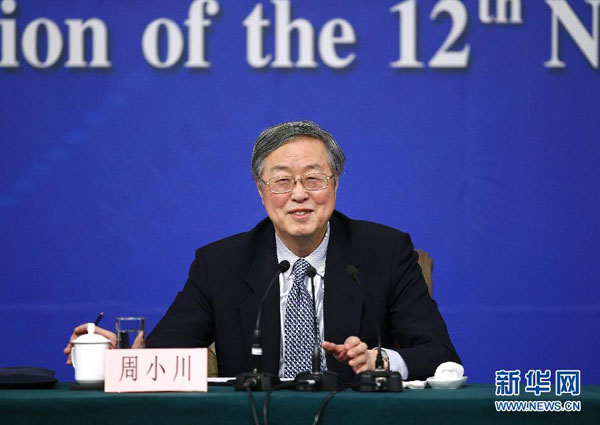


China's central bank governor Zhou Xiaochuan at a news conference on March 12, 2015. [Photo: Xinhua]
China's central bank governor Zhou Xiaochuan said on Friday that China would continue to promote an exchange rate mechanism which meets higher standards of market economy in the next stage.
In this regard, China will continue to promote more flexible exchange rate, free flows in capital and current accounts, convenient convertibility between Chinese currency and foreign currencies, and to provide more risk-management instruments for both domestic and international investors, Zhou, governor of the People's Bank of China (PBOC), said at the Michel Camdessus Central Banking Lecture held by the International Monetary Fund (IMF) on Friday.
In the question and answer session, Zhou said that these moves could also help deepen the connection between the Chinese economy and the global economy, as China was getting more integrated into world economy.
China is reducing unnecessary controls over the exchange rate market, and introducing more risk-management instruments, such as foreign exchange swaps and derivatives, to help Chinese businesses and citizens get prepared for a possible more volatile exchange rate market, said Zhou.
IMF last year approved the inclusion of the Chinese currency, RMB, into its Special Drawing Rights (SDR) basket as a fifth currency, along with the U.S. dollar, the euro, the Japanese yen and the British pound, marking a milestone in the RMB global march.
Zhou said that China is expecting the wider use of SDR, and is taking measures to promote freer use of RMB in trade, investment and financial markets, in an effort to reduce barriers for SDR users.
In regard to Chinese firms' high leverage ratio, Zhou said that China is working to improve the economy's resources allocation, and to ensure more resources flowing to the private sector, high-tech companies and the service sector.
Meanwhile, Chinese regulators are working together to analyze the rooted problems for companies with high leverage ratios and take coordinated measures to solve these problems, such as promoting syndicated loans, urging banks to reduce their leverage, promoting corporate governance reform, and strengthening investor education, he said.
China is strengthening its supervision over fast growing shadow-banking activities, said Zhou.
He noted that some challenges remained, citing that the strict capital requirements for banks would lead them to pursue businesses free from capital regulation; the booming development of internet financing business was testing the boundary of regulatory policies.
If internet companies operate financial business, they should also follow the current regulatory policies, said Zhou.
 Five made-in-China hi-tech breakthroughs
Five made-in-China hi-tech breakthroughs Beijing Style: Hot pants
Beijing Style: Hot pants HK-Zhuhai-Macao Bridge to open to traffic
HK-Zhuhai-Macao Bridge to open to traffic China opens its first combined transport service to Nepal
China opens its first combined transport service to Nepal Students take stylish bikini graduations photos
Students take stylish bikini graduations photos Charming dancing students pose for graduation photos
Charming dancing students pose for graduation photos Guizhou, Yunnan section of Shanghai-Kunming railway connected
Guizhou, Yunnan section of Shanghai-Kunming railway connected Naked models transformed into landscapes, birds and even DRAGONS by body painting artist
Naked models transformed into landscapes, birds and even DRAGONS by body painting artist World’s biggest cruise ship Harmony of the Seas to start maiden voyage
World’s biggest cruise ship Harmony of the Seas to start maiden voyage Top 20 hottest women in the world in 2014
Top 20 hottest women in the world in 2014 Top 10 hardest languages to learn
Top 10 hardest languages to learn 10 Chinese female stars with most beautiful faces
10 Chinese female stars with most beautiful faces China’s Top 10 Unique Bridges, Highways and Roads
China’s Top 10 Unique Bridges, Highways and Roads Dog meat delicacy
Dog meat delicacy Don’t group ‘Asian Americans’ together
Don’t group ‘Asian Americans’ together Shark protection needs more than losing taste for fin soup
Shark protection needs more than losing taste for fin soup When Western junk food hits Chinese tastebuds, unexpected new flavors emerge
When Western junk food hits Chinese tastebuds, unexpected new flavors emergeDay|Week